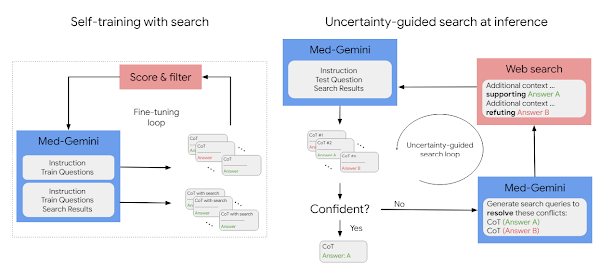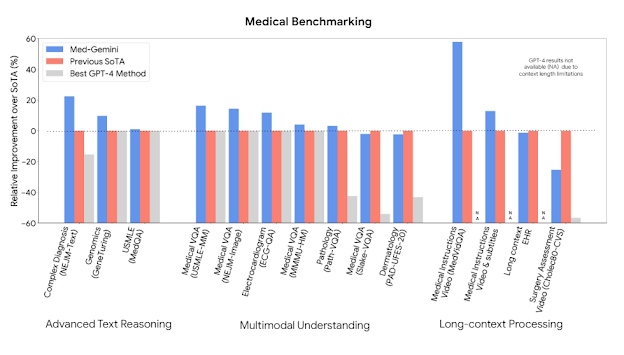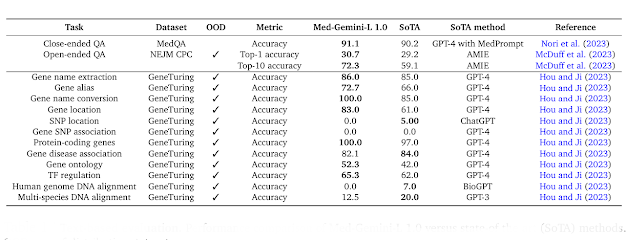Introduction
The medical landscape is in the midst of a transformative phase, with technology playing a pivotal role in reshaping healthcare delivery and patient care. The integration of Artificial Intelligence (AI) into medical applications has ushered in a new era of possibilities, addressing some of the most critical challenges faced by healthcare professionals today. From AI-driven predictive analytics to personalized medicine and advanced imaging techniques, these innovations are revolutionizing our approach to medical problems.
However, this rapid advancement is not without its challenges. Data privacy concerns, the need for robust AI training datasets, and the seamless integration of AI into existing healthcare systems are some of the hurdles that need to be overcome. Amidst these challenges, a new AI model, Med-Gemini, has emerged with the potential to make significant contributions to the advancement of AI in medicine.
Med-Gemini is the result of a collaborative effort between Google and DeepMind. Developed by a team of dedicated researchers, Med-Gemini aims to excel in a variety of medical applications. It is designed to not only perform advanced reasoning but also to have access to the latest medical knowledge and understand complex multimodal data. The development of Med-Gemini aligns with Google and DeepMind’s commitment to leveraging AI to solve complex problems and improve lives. The team behind Med-Gemini sought to create a model that could leverage the core strengths of the Gemini architecture while specializing in the medical domain.
What is Med-Gemini?
Med-Gemini is an innovative family of multimodal models that are specifically designed for the medical field. These models are built upon the robust foundation of Gemini, a set of models developed by Google, renowned for their exceptional capabilities in multimodal and long-context reasoning.
Key Features of Med-Gemini
Med-Gemini is equipped with several unique features that make it stand out:
- Advanced Reasoning Capabilities: Med-Gemini is designed to provide more factually accurate and nuanced responses to complex clinical queries. This is achieved through self-training and integration with web search, enhancing its reasoning capabilities.
- Enhanced Multimodal Understanding: Med-Gemini can adapt to novel medical data types like electrocardiograms. This feature allows it to understand and process a wide range of medical data, enhancing its versatility in the medical field.
- Efficient Long-Context Processing: Med-Gemini has the ability to reason over lengthy medical records and videos. This feature is particularly useful in the medical field where comprehensive analysis of extensive data is often required.
Capabilities/Use Case of Med-Gemini
Med-Gemini’s capabilities span across multiple medical disciplines, showcasing its versatility and potential in healthcare innovation:
- Enhanced Disease Diagnosis: Med-Gemini’s training enables it to scrutinize medical imagery with remarkable precision, facilitating the identification of disease markers and aiding in early diagnosis.
- Personalized Medicine: Leveraging individual patient data, Med-Gemini customizes therapeutic strategies and medication regimens, aligning treatment with personal health profiles.
- Drug Discovery and Development: In the realm of pharmacology, Med-Gemini accelerates the discovery and validation of new drug candidates, streamlining the path from laboratory research to clinical trials.
- Predictive Analytics: Utilizing data from public health records and personal health devices, Med-Gemini forecasts health trends and potential epidemics, contributing to proactive public health measures.
- Medical Text Summarization: Med-Gemini has been evaluated against expert human performance in condensing medical texts, demonstrating its capacity to support healthcare professionals with succinct, actionable summaries.
How does Med-Gemini work?
Med-Gemini harnesses the power of AI in three distinct yet interconnected domains: clinical reasoning, multimodal data interpretation, and processing extensive medical histories.
Clinical Reasoning: At its core, Med-Gemini mimics the analytical thought process of healthcare experts. It’s capable of breaking down intricate medical inquiries, considering a multitude of aspects, and providing well-thought-out conclusions. This feature is crucial for tasks demanding a deep grasp of medical literature and practices.
Multimodal Understanding: Med-Gemini’s proficiency extends to interpreting various forms of medical data, be it textual, visual, or even complex signals like ECGs. This versatility enables the model to be applicable across different medical contexts, offering relevant insights and assessments.
Long-Context Processing: The medical sector often deals with detailed patient histories and complex data. Med-Gemini is adept at managing such extensive information, allowing it to analyze and reason through detailed medical records and lengthy diagnostic videos.
To realize these functions, Med-Gemini utilizes a blend of fine-tuning and self-training methods.
Fine-Tuning: Fine-tuning involves adapting a pre-existing model, here the Gemini 1.0 Ultra, to improve its performance on specialized tasks. The Med-Gemini-L 1.0, designed for sophisticated reasoning tasks, is a product of this fine-tuning, equipping the model with the expertise needed for medical applications.
Self-Training with Search: Self-training allows Med-Gemini to learn from its own generated predictions. Combined with web search, this technique bolsters the model’s reasoning capabilities. Through an iterative process, Med-Gemini produces ‘Chain-of-Thoughts’ (CoTs) responses, refining its use of external data to enhance accuracy and adaptability.
Uncertainty-Guided Search Process: During its operation, Med-Gemini-L 1.0 employs a unique uncertainty-guided search mechanism. This involves creating various reasoning pathways and selecting the most certain ones. It then formulates search queries to clarify uncertainties, integrating the search findings to inform more precise responses. This cyclical method significantly improves Med-Gemini’s proficiency in delivering detailed and accurate answers to complex medical questions.
Performance Evaluation of Med-Gemini
Med-Gemini has demonstrated exceptional performance, establishing new benchmarks in the medical domain. As shown in below figure, It has achieved state-of-the-art results on 10 out of 14 medical benchmarks, outperforming the GPT-4 model family in every instance where they were directly compared.
Specifically, on the MedQA (USMLE) benchmark, as shown in below table, Med-Gemini-L 1.0 reached an impressive 91.1% accuracy, creating a new benchmark for excellence. This model not only exceeded the performance of its predecessor, Med-PaLM 2, by 4.5% but also edged out the GPT-4 enhanced with specialized prompting known as MedPrompt by 0.9%. Med-Gemini’s methodology, which incorporates a general web search within an uncertainty-guided framework, offers a scalable solution for more intricate medical queries beyond the scope of MedQA.
In the realm of diagnostic challenges, such as those presented by the NEJM CPC benchmark, Med-Gemini-L 1.0’s performance was superior to the AMIE model—which itself is an improvement over GPT-4—by a significant margin of 13.2% in top-10 accuracy. This approach to search integration has also proven to be effective in genomics knowledge tasks.
When examining the GeneTuring modules, Med-Gemini-L 1.0 outshone the leading models in seven different categories, including Gene name extraction, Gene alias, and Gene ontology, among others. It is important to note that while GeneGPT achieves higher scores through specialized web APIs, our comparison is with previous models that, like ours, rely on a general web search.
The impact of self-training coupled with uncertainty-guided search on Med-Gemini-L 1.0’s performance is noteworthy. When compared to its performance without self-training, there was a significant improvement of 3.2% in accuracy. Furthermore, with each successive round of uncertainty-guided search, the accuracy rose from 87.2% to 91.1%.
Access and Use
Med-Gemini is currently in the developmental research stage and has not been released for general public application. Nonetheless, those interested in understanding its framework and potential applications can refer to the pre-print research documentation that is accessible for academic review and study. Relevant links are provided at the end of this article.
Limitations
While Med-Gemini has shown promising results, It has certain limitations:
Med-Gemini faces challenges in clinical reasoning under uncertainty, and may exhibit confabulations and bias. It requires further research to restrict search results to authoritative medical sources and analyze their accuracy. Certain medical modalities not heavily represented in pretraining data could limit its effectiveness. Rigorous validation is crucial before deployment in safety-critical domains. Improvement is needed in tasks like retrieval from lengthy health records or medical video understanding.
Conclusion
Med-Gemini represents a significant leap forward in medical AI, with its advanced capabilities and potential for real-world applications. Med-Gemini could be a game-changer in healthcare, offering solutions to complex medical challenges and paving the way for future innovations in the field. The ongoing development and evaluation of Med-Gemini will undoubtedly continue to contribute to the advancement of AI in medicine.
Source
Research paper : https://arxiv.org/abs/2404.18416
Research document: https://arxiv.org/pdf/2404.18416
Disclaimer - It’s important to note that the article is intended to be informational and is based on a research paper available on arXiv. It does not provide medical advice or diagnosis. The article aims to inform readers about the advancements in AI in the medical field, specifically about the Med-Gemini model.





No comments:
Post a Comment